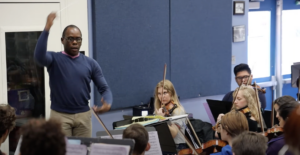
Music programs are a vibrant part of Texas schools. Most elementary schools include music for all students on a rotating schedule, where each grade level comes to music class once or twice a week. Elementary students are often engaged in singing, instrumental performance, improvisation, and composition activities. There may be only one elementary music specialist assigned per campus, depending on district size and the number of students enrolled.
In both middle and high schools, students complete at least one fine arts credit. At both levels, music classes are specialized in the disciplines of band, orchestra, and choir, and some schools offer general music options, or piano and guitar instruction as well. Students are given opportunities to perform music in groups that vary in size and can compete in individual, small group, and large ensemble contests and festivals. The number of directors employed on a middle school campus is often based on the number of students in the program. Choral classes are typically organized into treble or tenor-bass ensembles, whereas band and orchestra classes are often divided by instrument groups at the beginning level and then by skill-based ensembles in subsequent years.
At the high school level, music classes continue to be organized by discipline and skill-based ensembles, and depending on program size, there may be more than one director teaching in each discipline. High school programs often offer more course options such as show choir, musical theater, marching band, percussion ensembles, guitar, mariachi, and chamber music classes, and there may also be non-performing music courses offered such as music theory.
There is something deeply satisfying about cultivating a young person’s love for music. Music teachers build gratifying relationships with students that persist for many years, providing teachers with the opportunity to watch students grow both musically and personally. They also provide leadership opportunities, give students a safe place to belong, and an important reason to come to school and stay in school.
Music teaching can provide experiences that will influence children for the rest of their lives—as musicians, as friends, as parents, and as citizens in a diverse society. Music students learn to express themselves and create something beautiful in collaboration with peers. They are asked to meet high expectations and persist toward achieving goals together; in music, students value the idea that they are contributing to something bigger than themselves. The study of music over time engages multiple areas of the brain in a way that can uniquely change its structure and function, often in ways that are advantageous for the development of personal, social, and academic skills.